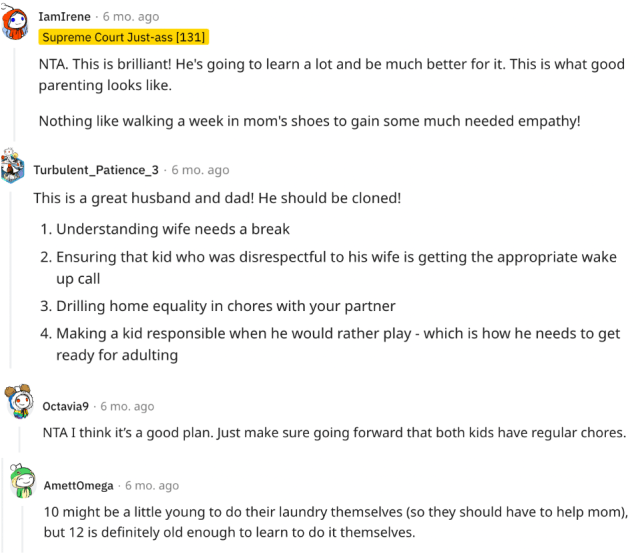One day, as the father came back home from work, he witnessed his 12 years old child expressing frustration towards his mother regarding the laundry.
The youngster asked his mother about the effort involved in washing his garments, which caught the father by surprise.
He felt sorry for his wife, fully aware of her dedicated work as a teacher, ensuring their family’s well-being throughout the day.

The dad often made an effort to handle most of the household chores to alleviate his wife’s workload, particularly considering her demanding teaching job.
After witnessing his son shouting at his mother, he guided the 12 years old boy to the laundry area. There, he instructed his son on the process of sorting clothes and operating the machines, so he could handle his own laundry.

How Did the Father Handle His Son?
In addition to assigning laundry duties, the father, driven by his concern, decided to impart a valuable lesson in responsibility to his child. As spring break drew near, he arranged for his wife to enjoy a vacation in Mexico with her friends, taking on the responsibility of looking after the children at home himself.
Since he worked remotely, he assigned household chores to his 12 years old son, including laundry, breakfast, and lunch preparation, along with his brother.
The young one found it surprising and unfair that his father expected him to handle housework during his vacation.

Later, his father inquired if he considered household chores to be a full-time occupation. The son concurred. It was then that the father helped him recognize something important, saying;
“I pointed out that both his mother and I have full-time jobs and still handle all the responsibilities he’s complaining about.”
Despite the perfect chance to impart a lesson to the youngster, it seemed that nothing registered with him. The child expressed his grievances to his paternal grandmother and inquired if he could spend spring break at her residence.

The grandmother, furious, phoned her son and accused him of mistreating “her precious child.” In response, the man posed a rhetorical question to his mother, asking what she and his father would have done if he had yelled at her for not doing the laundry. She explained that times had changed, suggesting that today’s children were not to be disciplined in the same manner as in the past.
Nonetheless, the father remained resolute. He conveyed to his mother that if she disclosed to his 12 years old son all the consequences he had endured during his time with them, he would consent to letting the boy spend the summer with her.

Upon recognizing that the punishments she had administered to her son were harsher than what her granddaughter had experienced, she conveyed to the 12 years old that he wouldn’t be able to spend the summer with her.
Although he harbored doubts about whether his discipline had been too strict, the father sought guidance from online communities, where people assured him that he had not acted wrongly.
The concerned father felt accountable for enabling his son to develop an entitled mindset, leading him to believe that shouting at his mother was typical pre-adolescent behavior.
One user offered this perspective: “I believe there’s a more profound issue you must address with your son. If your older son has been exposed to misogynistic attitudes, it’s important to ensure your younger son doesn’t adopt them as well. Both of them should understand that women are equals, not servants, and they should share responsibilities.”

“Instead of a punitive approach, I do recommend approaching this as a valuable learning experience for your son,” another person suggested. “View it as an opportunity for genuine growth rather than just punishment.”
Do you think the father’s punishment was suitable? What approach would you have taken if you were in his shoes?
Leave a reply















